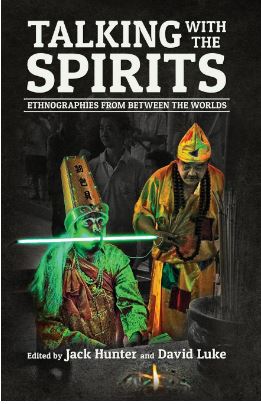 Talking with the Spirits: Ethnographies from Between the Worlds edited by Jack Hunter and David Luke
Talking with the Spirits: Ethnographies from Between the Worlds edited by Jack Hunter and David Luke
Reviewed by Paul Williams
This far-reaching collection of essays portrays the subtle differences in world-wide beliefs in the existence of spirits of the dead, and explains how their energy can be harnessed by the living to ease the pain of bereavement and cure illness. It is an eclectic collection based on research in countries all over the world, a must-read for those with an inclination to learn more about the mystical experience and the different ways in which the spirit can manifest itself through the intermediary of a medium. Its conclusions are based primarily on first-hand experience in the field, and we are told (Hunter) that the research ‘seeks to take the first-hand experiences of fieldwork informants seriously, at face-value’ and that ‘the experience itself has validity and…such beliefs are not to be lightly brushed aside as necessarily irrational or unfounded’. This very proper emphasis on the importance and relevance of fieldwork is supported by wide and pertinent reference to earlier published material. One or two of the bibliographies are first-rate and provide a firm academic grounding to the fieldwork which throughout is fresh and honest. In this respect the book is a valuable addition to what we know so far about the rôle of mediums and the identity of the widely differing spirits who possess them.
Contrasting Islam with Christianity, Stöckligt’s paper, which has a wider remit than many of the others, rightly points out how Islam in Africa is not in conflict with traditional beliefs such as divination and magic, while Christianity has little acceptance of traditional world views. That may be the case for Africa, but once transferred to the New World the vestiges of each religion develop vibrances that can be harnessed for healing the sick. Maraldi (et al.) mention, albeit very sparingly, only three in Brazil: Arigó and Dr Fritz (who started their work in the 1950s), and the contemporary João de Deus (John of God). But sadly they go on to provide inconclusive evidence of John of God’s successful healing because samples taken are lamentably small. We are given no idea of the size of his following; there is no mention of his web page which invites the healing process to begin on line; and we are left with no reliable indication as to how to evaluate his work.
This collection of papers prompts a host of unanswered questions, but what it leaves out highlights the area which must be addressed next. We already have enough documented evidence of what actually happens in a séance and how mediums in certain cultures effect astonishing cures, but what we need now is significantly more evidence and, by extension, a lot more funding. Among all the papers that make up this book Brazil emerges as the most fertile country in which to observe spiritual healers working alongside, not in conflict with, medical doctors in a united and determined effort to ascertain how much spiritual forces can contribute to the healing process. This could be the editors’ next project but it will need substantially more resources and watertight evidence to make a convincing case.
Laboured language and unnecessarily obscure writing styles do little to reassure the reader or maintain his full attention. These essays on the whole are too long and would communicate their content more energetically if they contained less verbiage. Other shortfalls, such as the highly avoidable proof-reading errors and a number of misspellings of foreign languages, do the book no favours. Dr Paul Williams is author of Primitive Religion and Healing; The Banker who turned to Voodoo.
